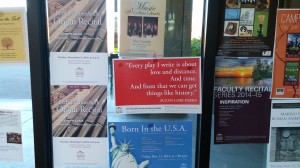In which Daniel attends an absurd and beautiful play, and contemplates the nature of narrative.
Every day from November 13th, 2002 to November 12th, 2003, award winning American playwright and screen writer Suzan Lori Parks (b. 1963) wrote a play. Some were as small as a single line, others as long as two pages, but all were compiled into a book entitled 365 Days/365 Plays, forming a cabaret of absurdist narratives linked together by a seemingly random combination of themes such as war, dancing ants, racial injustice, sou’westers, and history. The Theater Department of the University of Puget Sound selected only 30 of these plays to be performed, and hoping to draw connections between the ridiculous but socially critical group of theatrical works and the genre of Domestic Fabulism, my Magical Realism professor Suzanne Warren decided that my class would read them before attending the play together.
At first glance, the plays seem random and somewhat unconvincingly bizarre. They are permeated with references to American history, myth, and monsters. Many of the stage directions are difficult or else impossible – demanding actions to be repeated into eternity – while facts about characters are given in places outside the dialogue, so that the audience will never hear them. Yet if taken with a grain of salt, the scripts can be a fascinating combination of character study, narrative examination and playwright practice, and the plays performed can be an amazing, albeit unconventional, discussion of identity, love, distance and time.
I was not surprised by the high level of acting of the university’s theater department, nor by the clever use of minimal staging and simple but powerful sets, but as a musician, one of the most fascinating aspects was the play’s use of music. It is strewn throughout the play at unexpected times, using Bach’s Cello Suite No.1 to musically narrate a flight attendant repeatedly performing a silent announcement of flight safety like a dance, and using avant-garde jazz and Beethoven pieces to musically pit modernity against tradition. Toward the end of the play, a character tries to comfort another by bursting into an unexpected but beautiful song, and ambient music opens and closes the show as unrelated characters bustle about their busy lives.
If there were to be one aspect of Park’s plays, and the university’s production of them, that I enjoyed the most, it would be the absurd optimism permeating both. In one of Park’s plays – one that the university did not perform – a fallen starlet of questionable sanity speaks to her sane companion, who is attempting to comfort her as they watch the starlight on the sea. “What if I don’t get to be the person that I want?” she asks. He replies, “Then you’ll be someone else.” I believe that there’s a great deal to be said for a work that can examine so many aspects of life, with such a combination of ridiculous humor and sincere compassion. So a hand to the university’s Theater Department, and I can only hope that my English class continues to deliver such deliciously absurd literature.

